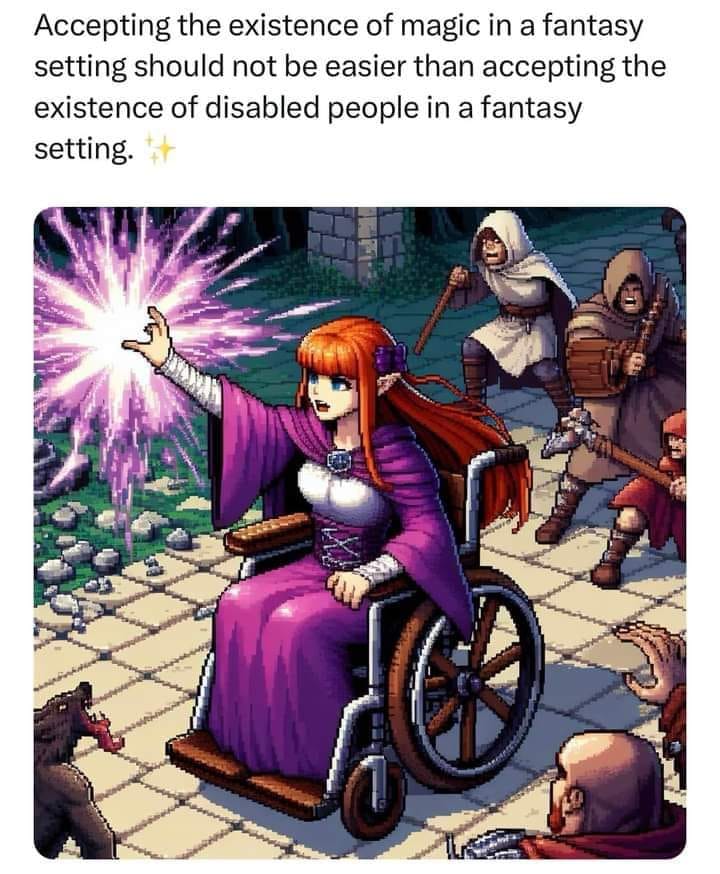this post was submitted on 10 Dec 2023
1096 points (94.1% liked)
RPGMemes
10366 readers
116 users here now
Humor, jokes, memes about TTRPGs
founded 1 year ago
MODERATORS
you are viewing a single comment's thread
view the rest of the comments
view the rest of the comments

Depends on the world, maybe some magic systems dont allow for healing or performing certain tasks?
A great example is the spell "Regenerate" in DnD
It's a 7th level spell so not many people will have access to it. And given the nature of wizards being super secretive about their spells it's no surprise it's not more common.
Also at my table I ruled that someone having such spells used on them can have the complexity of the idea of "self" play a role on what is healed. ie they may be willing but after a long time ones idea of self will play a role in what one sees as "complete" and what gets regenerated
That is fascinating, do you mind elaborating? I'm reminded a little of the "ship of Theseus" concept. Like, would the initial regeneration of a limb affect the quality of future healing and/or regeneration, or is it more of a long-term psychological effect like "my arm is back, but I don't 'feel' like this is my real arm"?
Not the person you asked, but I think the idea of “self” in this case is “how do you picture yourself when you imagine yourself whole/healed.”
Born without a limb 30 years ago? You likely can’t regenerate it, because when you picture who you are, you’re a one limbed person.
But it plays in other ways as well. For instance, while regenerate may technically have the ability to regenerate problems such as the example from a meme a while back where a person had their appendix removed, the idea of self would inherently include their appendix being removed as that’s the only way they could see themselves as whole/healed.
Exactly, how one sees themselves as complete and whole plays a role in it.
Plus there's the whole "if you were born without, that's at most your complete state."
So if someone was born without an arm they'd need a lot more than Regenerate to get that arm, it's take a True Polymorph to get it.
See that would be the defining information.
To what extent to the healing spells heal?
But I'm reminded of that dnd shitpost about revivify and how it even regrows lost limbs and I feel like something like a spinal cord or ocular nerve would be fixed by that.
Hell you could make a hospital where they just kill you if your sick or wounded then revivify your ass back to full health lmao
Revivify doesn't regrow lost limbs. That's explicitly stated. You're thinking of resurrection, which is 7th level and costs a diamond worth 1000 gp.
Yeah tbh I don't know much about dnd other than what I've gathered through memes and shitposts
Just seemed like something magic should easily be able to take care of
There's a lot of lower level magic that would make stealing a diamond easy.
I haven't checked how this is presented in 5E, but I remember in 2E that the costs of the stronger healing spells that operated on more than hit points, and especially the Raise Dead and Resurrection spells had a very high cost in material components, and took their toll on the caster. In other words, not to be used lightly and all the time. Which means finding someone to cast it for you would come at a correspondingly high cost.
In a well-designed campaign world, that should be reflected in either a high monetary cost for the casting of such spells (a church requesting a sizable donation, for example) or some kind of demonstration that the target is worthy in the eyes of the church or its god.
This can actually turn into a storytelling and role-playing opportunity. Imagine you're blind, and you and your party need to prove that you're a worthy person while blind before they'll restore your sight. Or the whole party is made totally blind for the duration of a test or short quest that you have to complete together before the restoration spell can be cast.
All this sufficiently explains the existence of blind people. Lack of imagination is not an excuse for bigotry.
Also, a character may be unable to get their sight restored, and that can and should be explored for its role-playing potential.
I think it boils down to what table you’re at. If you want to have strictly defined rules, then you build out a table with players that has strictly defined rules that the world and players must adhere to. If you’re all kind of OK with “rule of cool” or hand waving away some things within reason (not so much that you’re just completely going Calvinball with the sessions though I’m sure some people like that as well!) that’s totally fine too.
Ultimately you are all just telling a story together. Anyone who is so angry about someone with a disability in their fantasy world that they are willing to leave the table - to the surprise of the DM and another player who clearly are not on that wavelength - is probably not somebody who is a good fit anyway.
The only critique I could possibly give the DM here is for them to reflect on whether or not they set proper expectations at the table. But frankly (barring critical info that has been left out) this is incredibly petty and a player with any emotional maturity should be able to talk through this and move forward with the group. What a strange hill to die on.